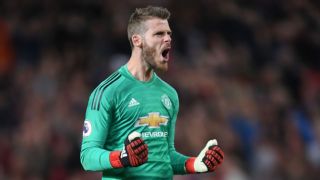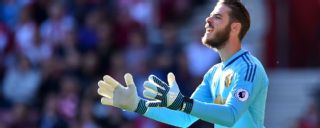|
Football's pendulum has swung back in David De Gea's favour ahead of Tuesday's Nations League meeting with Croatia -- or at least the public pendulum of the "You're great ... now you're rubbish!" curse that his profession traditionally bestows on those of high profile. Build 'em up, chop em down. During the World Cup, errors notwithstanding, De Gea's profile in Spain was constructed from the "He's no Iker Casillas" or "This guy's never really done it for Spain" narrative. It's a Cyclops-style debate, low-level rubbish. On Saturday night, both the football world and social media, plus of course his teammates, combined to emit a combination of purring satisfaction, "Eureka!" and "Long Live De Gea!" Pendulums swing away, then pendulums swing back. What has never really happened, from his first error this summer -- in the 1-1 friendly draw against Switzerland -- until after Spain's 2-1 win at Wembley, is a proper analysis of "Why?". Why might a world-class professional suddenly morph from his club's most reliable, most coveted footballer, to someone who looked jittery and unable to produce the against-all-odds saves and subtle reaction deflections when it counted that, a few weeks before, were his stock-in-trade and made him look invulnerable? Saturday night went a long way to underpinning a contention that was born in Russia, which I ran past some of those who work with him daily and that, frankly, won't surprise anyone in the goalkeeping trade: De Gea is a footballer who loves, in fact requires, to feel involved in a match. He's not a miracle-producing adjunct to the action like Casillas was, or Champions League winner Stefan Klos in his day. Those two, among many other of their profession, are the cats. They are the agile, happy-to-be-left-alone-for-long-spells, individualistic loners who will be perfectly content to come off a pitch having done nothing in a 1-0 win. They don't necessarily have all the housekeeping tools that a tidy, orderly keeper possesses. They may look eccentric and appear as if they are living on several of their nine lives at the same time, but they're the type who will back themselves 100 percent in a one v one, "the keeper's got no chance" type of incident. Like a card sharp, a Western gunslinger, they love the whites of the opponents' eyes. They're just as likely to produce gymnastic feats of genius if they've been working like trojans under pressure for the previous 20 minutes or standing watching the game go their team's way while leaning on a goalpost. De Gea does not, and never will, resemble that kind of keeper. Before he'd define himself as a keeper, he'd probably say. "I'm a footballer." From the start of his career, in futsal, where he was a top-scoring striker, until now, probably Manchester United's most valued player, his modus operandi has been to be involved in matches. Either playing out from the back, taking a series of passes around the penalty box to dig defensive teammates out of high presses, showing his sweeper-keeper prowess (he's terrifically deft with the ball at his feet) or distributing possession -- this is where David De Gea feels in his environment. What's increased his need to be pivotal is the brand of football by which he's emerged as one of the world's top four or five keepers -- often rated, by good judges, top of that quintet. At Atletico Madrid, largely under Quique Sanchez Flores, Los Rojiblancos were a team of ebb and flow. Look back at the types of scorelines that were commonplace as De Gea caught the eye of United's goalkeeping coach Eric Steele. His couple of seasons between the sticks of the Vicente Calderon included a raft of three-, four-, five-, six- and even seven-goal thrillers. Some in favour, some against. If not "goalkeepers on top", it was always "keepers kept busy". Even as the seesaw alternated between big wins and heavy defeats, De Gea's basic work stood out sufficiently for Steele, and Sir Alex Ferguson in his first visit to watch the then-teenager, to be instantly convinced. At United, even after Steele's intense tuition meant De Gea developed a stronger upper body, ate better, commanded his box better and his confidence soared, he still played in teams that conceded chances. Last season, De Gea had the best save-to-chance ratio in England's top flight, meaning that he was worked, reacted and came out on top. He thrived. I know that De Gea feels that working in the Premier League means he will automatically face more shots, more crosses, more one-v-one chances, more free kicks and more constant pressure than La Liga, but especially more than international football. The Premier League's traditional ebb and flow, especially while United don't dominate the ball and allow chances, forces his concentration and brings the best out in De Gea. His midfield and defence constantly rely on him, not only to pull them out of the brown stuff, but as an out ball.  In the Krasnodar-based training camp, I watched this guy work under Julen Lopetegui and, in due course, Fernando Hierro. When the 27-year-old Madrileno played in Spain's famous pass-chase "Rondo" drills or outfield in one or two practice matches, he looked elegant on the ball -- just another top-class player, not a keeper playing out. He was fully confident and composed -- he was happy. When he plied his actual trade, on match days, Spain's No. 1 wasn't himself, shorn of a millimetre of confidence, assurance and authority. During La Roja's summer fiasco, their keeper was denied the ball a great deal -- denied involvement, protagonism. Not because this was anything like the golden age of Spain, when Xavi, Xabi Alonso, Sergio Busquets and Andres Iniesta throttled opposition with possession, instead because all of Spain's six friendly and competitive rivals -- with the exception of Portugal -- sat deep, blocked and then broke. It's no excuse for some of his errors, particularly the daisy-cutter from Cristiano Ronaldo, but De Gea was isolated, under-involved and he suffered. He, and all his team, showed nerves. "What hurt us the most wasn't overplaying the ball in possession, it was how easily teams broke and damaged us," Iago Aspas commented last week. Compare that to Saturday at Wembley. Emanating a sense of security from start to finish, De Gea made three very good saves, each from Marcus Rashford, even though one was ruled offside after the save was made. His body language and facial expressions reflected a man fully enjoying his work again. Spain don't need to bring the ball back to their own defensive third to keep their keeper occupied, involved and alert. Luis Enrique said he had "no doubts" about picking his keeper ahead of the England game, that "form aside, he's one of the world's best goalkeepers". Good words, accurate too, but what the man holding down two of the most high-profile jobs in club and international football now knows is that he needs to add to his armoury. If De Gea thrives when busy, when he feels central, fine. If there's a perpetual chance of dropping intensity when the ball is only an occasional visitor to his territory, then De Gea needs to address and eliminate that Achilles heel -- for joint benefits of his club, his country and his own, already established, excellence. I've no doubts that he'll do so.
|

